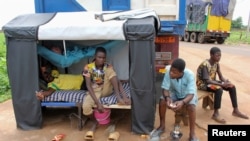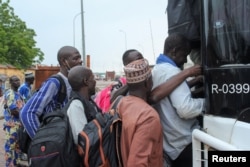Additionally, food prices have increased by up to 21% — a serious issue in a country where some 3.3 million Nigeriens, or 13% of the population, "are severely food insecure," a statement from regional U.N. agencies said.
"Over 7 million people (approximately 28% of the population) are at risk of falling into severe food insecurity due to price hikes and loss of livelihoods triggered by the ongoing political crisis," the agencies said.
"Access restrictions are hindering the delivery of essential aid. WFP, the U.N. food agency, has over 7,300 tons of food including specialized foods for the treatment and prevention of malnutrition that are stuck in transit due to border closures."
Worried that donors may pull out in light of the ousting of President Mohamed Bazoum, "The U.N. is deeply concerned that any suspension or interruption of donor funding in Niger will not only impact the immediate humanitarian response, but also roll back hard-won community resilience and development gains," the statement added.
Further complicating things, the junta announced late Thursday it was stopping U.N. agencies, NGOs and international organizations from working in military "operation zones."
It did not specify which regions were affected, but said the measures were "due to the current security situation."
Meanwhile in neighboring Mali, also run by a junta and dealing with a long-running conflict, some 200,000 children are at risk of dying of hunger, according to the U.N..
"Protracted armed conflict, internal displacement and restricted humanitarian access risks pushing nearly one million children under the age of 5 in Mali into acute malnutrition," by the end of the year, UNICEF said in a separate statement on Friday.
"At least 200,000 (are) at risk of dying of hunger if live-saving aid fails to reach them," it added.
Nearly a quarter of the West African nation's population suffers from moderate or acute food insecurity, according to UNICEF.
"For the first time ever in the country, over 2,500 people are at risk of famine in the crisis-affected region of Menaka," UNICEF said.
The U.N .peacekeeping mission in Mali is in the process of pulling out of the country, at the request of authorities in Bamako — potentially putting humanitarian work at risk from even greater insecurity.
UNICEF and the World Food Program "urgently" need $184.4 million in funding to reach 8.8 million people in need in Mali, the agency said, including money needed for vaccine cold storage and malnutrition treatments.


Forum